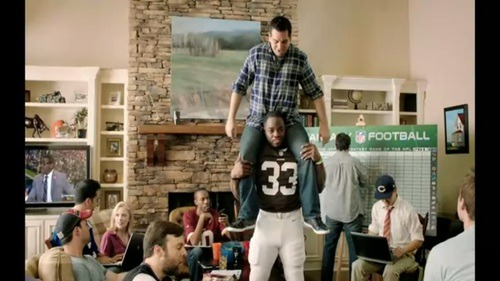#brandon jacobs

… but the NFL loves it when you think you do. Here’s why the league has a financial interest in dehumanizing its employees.
Themessage arrived sometime prior to Monday night’s meeting with the Vikings, beamed directly to New York Giants running back Brandon Jacobs through his Twitter account:
ON LIFE BRANDON IF YOU DON’T RUSH FOR 50 YARDS AND 2 TOUCHDOWNS TONIGHT ITS OVER FOR YOU AND YO FAMILY NIGGA
Two minutes later, another:
FULFILL MY ORDERS STATED IN THE PREVIOUS TWEET OR THATS YO LIFE BRUH AND IM NOT PLAYING
Perhaps the most shocking part of the whole ordeal is that Jacobs chose to respond. He posted the messages in public, a move that shamed the already embarrassingly named @DMMEBoo into submission. After backing off of his threats at an impressive speed, @DMMEBoo eventually vanished from Twitter altogether.
It’s sure to be a short-lived victory. Check the Twitter feeds of any prominent NFLer on game day and you’ll find hundreds of insults, disparaging remarks and threats demanding that he produce on the field, or else. For as many fans that use Twitter to try and get a piece of their favorite player, it seems just as many think they’re entitled to one.
That fans believe they’re owed something from a player – that they “own” him – isn’t new or surprising. It’s a notion that’s infected every sport, encouraged by dumbcolumnists and assorted othermouthbreathers.
But only in the NFL does this idea of “owning” an athlete enjoy institutional support. It’s made clear in the way the NFL brands itself: the Shield above all, supported by 31 benevolent owners interested only in putting the best product possible on the field. Leaving aside the troubling racial aspects of (mostly white) owners characterizing their (overwhelmingly black) employees as a collective product, it’s an approach that at the very least has successfully dehumanized the average NFL athlete in the eyes of the average fan. And the league spends considerable effort keeping it that way, controlling nearly every marketable aspect of the game-time experience down to the color of the flourishes on a wide receiver’s cleats.
It’s fast become the case off the field too. Consider fantasy football, a $70 billion industry that is growing exponentially each year. There’s little doubt that giving ordinary fans the power to “draft” players and assemble “teams” has exacerbated the perception of ownership over athletes. After all, that was @DMMEBoo’s motivation for messaging Brandon Jacobs in the first place. Thousands root for their fantasy team rather an actual team, and it’s almost commonplace to worry first about a player’s fantasy value instead of the player himself when he’s injured, traded or released.
Given the opportunity to dampen that trend a bit, or at least not encourage the treatment of humans as commodities, the NFL instead produced this stomach-turning commercial:
Leaving aside once again the troubling racial aspects of (all white) owners literally riding (overwhelmingly black) athletes, the ad fully promotes the concept of fans viewing and treating NFL players as machinery put in place solely to achieve a greater end.
And why not? The more that you, the paying fan, believe that players are interchangeable cogs worth only as much as their latest production, the better the NFL makes out.
The league and team owners are free to continue signing athletes to non-guaranteed contracts that allow them to simply cut ties when those athletes get injured or become less useful. They’re free to fine them tens of thousands of dollars for having the gall to raise awareness for mental health by wearing different-colored cleats. They’re free to paint the game in terms of war without providing or even acknowledging the need for the kind of mental and physical health care deserving of high-level American employees, much less battle-scarred troops. They’re free to make the ruthless decisions that are fiscally sound but morally bankrupt, and yet still enjoy immense popularity.
The NFL isn’t going to try to dissuade you from treating their players like chattel. It makes too much business sense. It’s going to be up to the individual fans themselves to realize that while it might be a game to us, for Brandon Jacobs and the rest of the players, it’s their livelihood and often their lives.
So let’s at least start with the basics. Watch your football, enjoy your fantasy team, even send a few messages to your favorite athletes on Twitter. But remember that they’re independent human beings with far greater concerns than your fantasy matchup. You don’t own them.
–
Adam Cancryn is an editor and co-founder of Began in ‘96.
